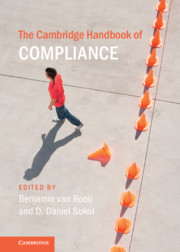Book contents
- The Cambridge Handbook of Compliance
- The Cambridge Handbook of Compliance
- Copyright page
- Contents
- Figures
- Tables
- Contributors
- 1 Introduction: Compliance as the Interaction between Rules and Behavior
- Part I Compliance Concepts and Approaches
- 2 Compliance as Costs and Benefits
- 3 The Professionalization of Compliance
- 4 From Responsive Regulation to Ecological Compliance: Meta-regulation and the Existential Challenge of Corporate Compliance
- 5 Behavioral Ethics as Compliance
- 6 Constructing the Content and Meaning of Law and Compliance
- 7 Compliance as Operations Management
- 8 Compliance and Contestation
- 9 Compliance as Management
- 10 Compliance as Liability Risk Management
- 11 Criminalized Compliance
- 12 Supply Chain Compliance
- 13 Regulatory Compliance in a Global Perspective: Developing Countries, Emerging Markets and the Role of International Development Institutions
- Part II Deterrence and Incapacitation
- Part III Incentives
- Part IV Legitimacy and Social Norms
- Part V Capacity and Opportunity
- Part VI Compliance and Cognition
- Part VII Management and Organizational Processes
- Part VIII Measuring and Evaluating Compliance
- Part IX Analysis of Particular Fields
- References
5 - Behavioral Ethics as Compliance
from Part I - Compliance Concepts and Approaches
Published online by Cambridge University Press: 07 May 2021
- The Cambridge Handbook of Compliance
- The Cambridge Handbook of Compliance
- Copyright page
- Contents
- Figures
- Tables
- Contributors
- 1 Introduction: Compliance as the Interaction between Rules and Behavior
- Part I Compliance Concepts and Approaches
- 2 Compliance as Costs and Benefits
- 3 The Professionalization of Compliance
- 4 From Responsive Regulation to Ecological Compliance: Meta-regulation and the Existential Challenge of Corporate Compliance
- 5 Behavioral Ethics as Compliance
- 6 Constructing the Content and Meaning of Law and Compliance
- 7 Compliance as Operations Management
- 8 Compliance and Contestation
- 9 Compliance as Management
- 10 Compliance as Liability Risk Management
- 11 Criminalized Compliance
- 12 Supply Chain Compliance
- 13 Regulatory Compliance in a Global Perspective: Developing Countries, Emerging Markets and the Role of International Development Institutions
- Part II Deterrence and Incapacitation
- Part III Incentives
- Part IV Legitimacy and Social Norms
- Part V Capacity and Opportunity
- Part VI Compliance and Cognition
- Part VII Management and Organizational Processes
- Part VIII Measuring and Evaluating Compliance
- Part IX Analysis of Particular Fields
- References
Summary
Abstract: This chapter studies the implications of behavioral ethics research to questions of legal compliance. Behavioral ethics emphasizes the concept of bounded ethicality, referring to a long list of biases and cognitive limitations that prevent people from making a full and candid evaluation of the ethicality of their own actions. In other words, people often act unethically not because they made a conscious choice to behave badly but because they were able to ignore, downplay, or justify their own misconduct. This chapter explores the meaning of behavioral ethics findings for questions of compliance with the law. That is, if people often ignore or downplay their own unethical choices, how can lawmakers and regulators act to improve compliance with the law? The chapter describes the central relevant findings of behavioral ethics research and the challenges these findings pose for legal compliance, and outlines possible solutions. In particular, we advocate a novel regulatory approach utilizing ethical nudges: regulatory interventions that are designed to improve ethical deliberations by potential wrongdoers.
- Type
- Chapter
- Information
- The Cambridge Handbook of Compliance , pp. 50 - 62Publisher: Cambridge University PressPrint publication year: 2021
References
- 2
- Cited by



